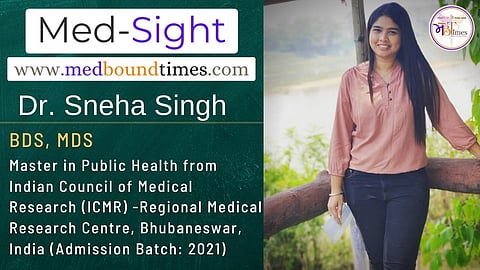

Name: Dr. Sneha Singh
Birthplace: Rourkela (Odisha), India
Educational background: BDS from Sharad Pawar Dental College, Maharashtra, India (2012-2017)
MDS in Public Health Dentistry from Rungta College of Dental Sciences and Research, Chhattisgarh, India (2018-2021)
Master in Public Health from Indian Council of Medical Research (ICMR) -Regional Medical Research Centre, Bhubaneswar, India (Admission Batch: 2021)
What is your current profile?
I am a postgraduate student pursuing a Master's in Public Health at the ICMR-Regional Medical Research Centre, Bhubaneswar, India.
What is the best part about your work?
The best part about being a public health student is learning how to improve lives and making a lasting impact on the health and well-being of the community.
What made you choose this unconventional line of profession? How did you think of Public Health Dentistry as a career?
I chose this unconventional profession as it offers unique opportunities for personal growth, creativity, and innovation. It allows me to challenge myself every day by exploring new paths and making a distinctive impact on society.
Public Health Dentistry is a broad field that offers a fulfilling career by promoting oral health in the community, implementing preventive measures, addressing disparities, and leaving a positive impact on the overall well-being of the community through various interventions.
Tell us more about your work and the culture/environment at ICMR, Bhubaneswar.
We work in a very peaceful environment and have very supportive colleagues and scientists who motivate us to work independently.
What are the various opportunities at ICMR? How can dentists from other fields apply/secure a job at ICMR?
ICMR provides opportunities such as fellowships, PhD programs, and permanent positions for scientists. Dentists can apply through JRF (Junior Research Fellow) or SRF (Senior Research Fellow) and get involved in various projects as non-medical scientists.
What is your vision for the future with respect to your career?
I want to secure a good position in the World Health Organization and pursue my career further.
Any interesting projects you've been working on recently?
I have recently completed work on the analysis of existing policies and programs on 'Heat Wave' management. We are currently working on National Family Health Survey-5 data to check the association of tobacco use among pregnant and lactating women in comparison with non-pregnant and lactating women.
What are the challenges you face in your day-to-day professional scenario?
Being public health students, we are prepared to face challenges in the field as well as in our workplace. The day-to-day challenges include limited resources and funding, complex health issues, differences of opinion between the community and professionals, and balancing multiple priorities.
What do you feel about the healthcare system?
I feel that the healthcare system provides improved access to medical care through advanced technology and enhanced healthcare infrastructure leading to increased life expectancy. However, on the other hand, there are gaps in the healthcare system, such as rising costs, inequality in access to healthcare, and challenges in achieving comprehensive and equitable healthcare coverage that need to be considered by the government.
How can the current system be made better?
To improve the healthcare system, the focus should be on universal access, cost control, preventive care, promoting health literacy, enhancing primary care, fostering interdisciplinary collaboration, leveraging technology for efficiency, addressing social determinants of health, and prioritizing patient-centered care with a strong emphasis on quality outcomes and patient satisfaction.
What was the impact of COVID on your profession? What challenges have you faced specifically during COVID?
During the COVID-19 pandemic, I was in my final year of MDS, so it was really impactful as we were able to help the other medical professionals, as there was a shortage of medical staff in the COVID Wards. We used to take complete precautions to save ourselves from infection, but we also cared about the patients' agony.
Did you always want to be a doctor?
Yes
What are your other fields of interest?
Research, Implementation, Communication, Monitoring and Evaluation
Your best memory?
The day when my first paper got published in an International Journal.
A professional achievement that you’re proud of:
During my MDS, I received a gold medal in my first poster presentation at a National Conference organized by the Indian Association of Public Health Dentistry (IAPHD). I have also been awarded a Gold Medal for scoring the highest marks in the Department of Public Health Dentistry.
What are your hobbies?
Dancing, playing cricket, badminton, basketball, and listening to music.
How many languages do you speak?
I speak around five languages, including English, Hindi, Odia, Bengali, and Marathi.
What advice would you give to budding doctors?
My advice to aspiring doctors would be to stay committed to lifelong learning, develop strong communication skills, and embrace teamwork and collaboration. Being a doctor is not just a profession but also a privilege and a lifelong commitment to serving others.
How can budding doctors contribute to society? Or to improve healthcare services?
Budding doctors can contribute to society and improve healthcare services by actively engaging in the following:
Volunteering in underserved areas or marginalized communities.
Participating in medical research to advance knowledge and treatment options.
Advocating for healthcare policy reforms to address disparities and improve access.
Educating the public about preventive measures and healthy lifestyles.
Engaging in community outreach programs to provide health screenings and education.
Your plans for the future?
My personal goal is to bring a small but impactful variation to the community that can make a big transition in their lives.
If your life were a movie, what would it be called?
"Uncharted Horizons: A Journey of Infinite Possibilities"
A quote you may relate to?
“Dream until your dreams come true.”
